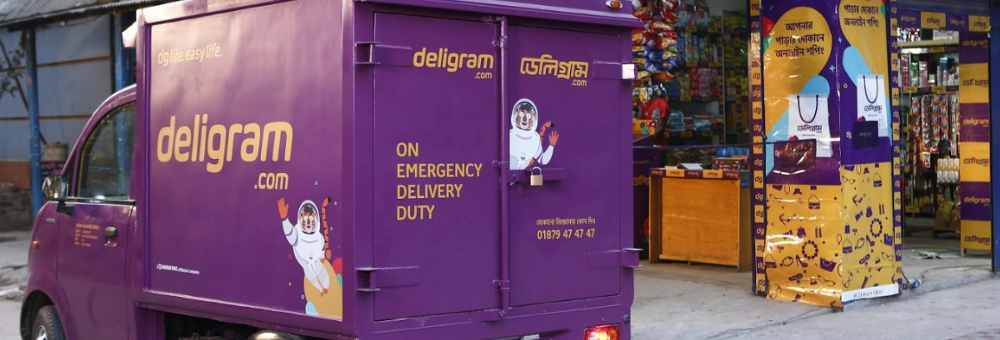
eCommerce company Deligram announced on October 12th that it has acquired Shopway, a startup focused on digitizing the B2B trade between retailers and distributors in the FMCG industry in Bangladesh and is moving away from its B2C model to focus on B2B ecommerce.
In a blog post published in Medium Deligram CEO Waiz Rahim explains that against the backdrop of coronavirus pandemic, Deligram wants to focus on sustainability and profitable verticals and the company has identified that digitizing B2B commerce is much more urgent work that would produce result quicker than the consumer market and is also a prerequisite to transform smallholder retailers into ecommerce force that Deligram originally wanted to do. “Both of our companies had initially been focusing on the B2C segment of reaching end-consumers from the retailers. Shopway eventually came to the same realization as us at Deligram — the mudir dokan retail infrastructure desperately needs a digital transformation in its supply chain — from FMCG companies to distributors to retailers. Without which, it is impossible to digitize the last mile between retailers & consumers.”, writes Waiz. Deligram or Shopway did not disclose details of the deal and the size of the transaction.
Under the deal, Shopway Founder and Chief Executive Officer (CEO), Firoz Uddin Ahmed will join Deligram as Chief Operating Officer (COO) and the new entity will focus on building a business at the intersection of digitizing the B2B FMCG supply chain and connecting smallholder retail outlets with local customers.
Shopway was founded in 2018 with an ambition to allow consumers to order from their nearest mudir dokans and get deliveries within an hour. Reminiscent of what Instacart (almost) is doing in the US, Shopway wanted to bring local smallholder retailers online, connect them with customers, and enable them to deliver online orders through logistics support.
Using the Shopway app, customers could find location-wise shops and order everything from grocery to daily essentials to medicine and then Shopway delivery agents would pick the products up from the nearby shop and deliver to the customers in less than an hour.
The startup raised an undisclosed angel round of funding and graduated from the GP Accelerator program. The company eventually pivoted away from the B2C model to the B2B model with an ambition to digitize the supply chain between manufacturers, distributors, and retailers in the FMCG industry in Bangladesh.
Deligram started off with an ambition to build an omnichannel ecommerce company in Bangladesh that operates at the intersection of online and offline using the local smallholder retailers locally known as mudi dokans both as hubs for order generation and deliveries. Starting its journey in 2017, over the past 3 years, Deligram has raised $2.5m USD in Foreign Direct Investment (FDI) from investors across Silicon Valley, New York & Singapore. From day one, Deligram started off with a fundamentally different approach to ecommerce growth in Bangladesh by putting 1.2m informal mom & pop shops, locally referred to as “mudir dokans'' at the center of its strategy. While the model attracted a lot of attention from the industry, it eventually proved to be expensive and failed to generate enough traction for Deligram for a myriad of reasons including a lack of digital exposure in the FMCG supply chain.
The new Deligram will focus on helping FMCG retailers and distributors go digital and then connect the same shops with customers. Using the Deligram app, shops can order from their nearest distributors. Shops can list their products for sales to nearby customers through Deligram app and WhatsApp channel, maintain a simple ledger using dgKhata to keep records of payables and receivables. Distributors can easily collect orders from retailers and increase their reach. Customers can find nearby shops and order via Deligram or Whatsapp.
With the new pivot, Deligram follows what Zilingo has done in South East Asia. There are broadly two businesses. One is B2B where Deligram builds a marketplace or digital window of sorts for retail outlets working with distributors and manufacturers where retailers can order goods in bulk. The second front is Delogram’s consumer business where it allows the same retailers to list their products on Deligram app and sell to local consumers. Supply chain digitization remains a strong trend in tech and companies like Zilingo offer an excellent example of opportunities in this space. But the pivot to B2B means Deligram has a long list of new to-dos to accomplish
Read our previous coverage of Deligram here.
Cover photo by Deligram
